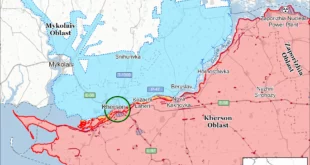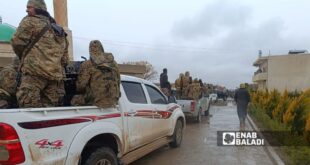At least 21 people were killed in Syria’s rebel-held Idlib province as government forces and their Russian allies intensified an air offensive on the country’s northwest.
A new ceasefire agreement between Russia and Turkey, which support opposing sides in Syria’s nearly nine-year conflict, went into effect on Sunday but violence has continued, according to rescue workers operating in opposition-held areas.
The Syrian Civil Defence, also known as the White Helmets, said air raids and barrel bombs on Wednesday struck a vegetable market in the town of Ariha, as well as repair workshops in an industrial area, a few hundred metres away from the market.
At least 19 people were killed in the attacks on the market and the nearby shops, including a Civil Defence volunteer, Ahmed Sheikho, a spokesman for the group, told Al Jazeera.
A man was also killed in the village of Has as a result of a Syrian government air raid, Sheikho said, while a young girl succumbed to wounds sustained in a previous attack, which took place before the latest ceasefire was implemented.
At least 82 people were wounded in the attacks on Wednesday and the death toll is likely to increase, according to the White Helmets.
21 innocent people have lost their lives today, and 82 others have been injured, as a result of the regime/Russian terrorist attacks on #Idlib and #Ariha market and many other places in northern #syria. The number of dead will climb as many are critically injured. pic.twitter.com/OSbgkynMz2
— The White Helmets (@SyriaCivilDef) January 15, 2020The bombardment engulfed several vehicles in the industrial zone, leaving the charred corpses of motorists trapped inside, an AFP news agency correspondent said.
Mustafa, who runs a repair shop in the area, told AFP he returned to find the shop destroyed and his four employees trapped under the rubble. It was not immediately clear if they had survived.
“This is not the neighbourhood I left two minutes ago,” Mustafa said.
The attacks come days after a brief lull. The ceasefire brokered by Moscow, which supports the Syrian government, and Turkey, which backs the rebels, faltered on Tuesday night when air raids hit a string of towns in the southern part of Idlib province.
Since December 1, about 350,000 people, mostly women and children, have been displaced by the renewed offensive, the United Nations said on Thursday.
The UN Office for the Coordination of Humanitarian Affairs (OCHA) said in its latest situation report that the humanitarian situation continued to deteriorate as a result of the “escalating” hostilities.
The short-lived ceasefire follows a previous truce announced in late August, after attacks by the government killed more than 1,000 civilians in four months, according to the UN.
Residents and rescue workers said many towns and villages in the province’s southern region are now empty as a result of the Russian-backed Syrian government offensive which has displaced hundreds of thousands of people since it began in April.
Meanwhile, spokesperson for the UN Secretary-General Stephane Dujarric on Wednesday said in a statement the world body is increasingly concerned about the safety of civilians.
“The UN urges all parties, and those with influence over those parties, to ensure the protection of civilians and civilian infrastructure, in line with their obligations under international humanitarian law,” he said.
The UN, which is responsible for delivering most of the aid to Idlib, has warned of the growing risk of a humanitarian catastrophe as people flee the fighting towards the overcrowded Turkish border area.
There are already about one million displaced people living near the border, with official camps already at full capacity.
Sara Kayyali, a Syria researcher for Human Rights Watch, said nearly four million civilians are “essentially trapped” in Idlib due to the relentless bombardment.
“It’s likely that many of these attacks on protected civilian infrastructure, where there is large civilian presence and no real military target, are likely to be war crimes,” Kayyali told Al Jazeera.
“Although human rights organisations are scaling up their operations, they simply can’t keep up with the demands,” she said.
Kayyali noted that numerous families are now left “out in the open, in the middle of freezing weather” with “no tents, no shelter, no food”.
“If they’re not being bombed, they’re dying because they’re hungry,” she said.
Government-led attacks have mainly struck areas close to the strategic M5 highway, one of the most important arteries in Syria’s transport network before the war erupted.
The Syrian government has been battling to take control of the road, which links the capital, Damascus, with the northern city of Aleppo, something that would allow it to connect cities under its control and boost trade.
The northwestern region is home to nearly three million people, about half of whom were transferred there in large groups from other parts of the country which had been held by rebels and were retaken by pro-government forces.
The war in Syria has killed hundreds of thousands of people and displaced millions since it began in 2011 with the repression of anti-government protests.
 Eurasia Press & News
Eurasia Press & News



